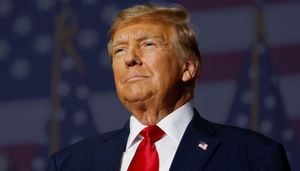Polish public opinion is manifesting notable skepticism toward U.S. President Donald Trump's actions relating to Ukraine, according to new surveys conducted by UCE Research and SW Research, shedding light on how perceptions differ across the political spectrum.
A survey by UCE Research for Onet posed the question, "Do you trust Donald Trump with his actions concerning Ukraine?" The responses indicated significant distrust among Polish respondents. Specifically, 24.6 percent of those surveyed stated they "definitely do not trust" the American president's moves related to Ukraine. Meanwhile, 25.8 percent said they "probably do not trust" him, and only 0.7 percent expressed definite trust, with 19.9 percent siding with "probably trust." This left 19 percent uncertain on the matter.
Karoline Leavitt, spokesperson for the White House, informed the press about President Trump's conviction of achieving peace with Russia over the Ukraine war, asserting this could realistically happen within the next week. Yet, the manner and urgency of Trump’s pursuit of peace have raised eyebrows both domestically and internationally.
Polling data indicates the most skeptical demographic is comprised of Left-wing voters, with 67.2 percent selecting "definitely do not trust" or "probably do not trust" Trump’s foreign policy moves. Voters from the Civic Coalition display similar sentiments, at 65.3 percent expressing doubts. Even among the Third Way voters, mistrust remains high, at 57.1 percent.
The skepticism is not just confined to general public sentiment but is echoed by commentators and experts analyzing Trump's political style and methods. "Donald Trump is a politician who might be sympathetic or not, but we cannot deny his effectiveness based on unconventional techniques," remarked Dr. Janusz Sibora. He noted the inherent unpredictability of Trump’s decisions, implying they may lack coherence, forcing aides to react defensively amid shifting strategies.
Former head of the National Security Bureau, General Stanisław Koziej, also weighed in, stating, "It is in Trump’s interest to terminate the war as quickly as possible, regardless of whether it is Ukraine, Russia, or Europe’s cost." He encapsulated the sentiment by saying the most important factor for Trump is establishing a truce during his presidency, framing it as a significant success irrespective of future ramifications.
When asked whether they believe the latest actions by Trump's administration will lead to lasting peace in Ukraine, the SW Research study found 46.2 percent opposing this notion, whereas only 25.3 percent placed their faith in Trump’s effectiveness. A notable 21 percent of respondents remained undecided, and 7.5 percent stated they were unsure about what specific American actions might be relevant.
Interestingly, confidence appears to be higher among the younger demographic, particularly those aged 24 and under, who tend to have more faith in Trump's initiatives. This divide within opinions also reflects broader generational shifts concerning political views and expectations for leadership.
While Polish skepticism remains pronounced, there’s no denying the complexity surrounding public attitudes toward Trump's presidency and foreign policy. The president’s bold assertions about peace negotiations create intriguing dynamics as he maneuvers through various political landscapes.
Though Polish public sentiment leans heavily toward distrust, consensus on how to approach international relations, particularly with Russia, remains fragmented across party lines. According to the surveys, as Trump's administration endeavors to establish its course with Ukraine, challenges are anticipated both domestically within Poland and internationally as the European Union grapples with its response to changing American diplomacy.
The tension between national sentiment and presidential initiatives raises questions about diplomatic credibility and the future of U.S.-Polish relations. With the polls indicating wariness concerning Trump's strategies, political analysts predict the upcoming weeks will be pivotal as the international community watches how Trump navigates this complex geopolitical terrain.
What will be the ramifications of this skepticism on future relations? And how will Trump’s administration react to pronounced doubts from key NATO ally states like Poland? The answers to these questions may shape the prospects for peace and security not only for Ukraine but for broader regional stability.



